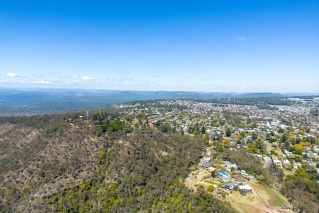Women fined over ‘reckless’ selfies, footage with K’gari dingoes

Two women have been fined $2300 each for “reckless” interaction with dingoes on K’gari (Fraser Island), including selfies and getting close to pups.
Queensland’s Department of Environment and Science said the women were fined after tip-offs from the public when images and video were posted on social media.
The 29-year-old NSW woman and a 25-year-old from Queensland each received a $2300 fine following a DES investigation.
“Both women have made an extremely dangerous decision to interact with wongari (dingoes), and that’s why they have been fined,” compliance manager Mike Devery said.
“The Queensland woman could have been bitten by the wongari, which was clearly exhibiting dominance-testing behaviour.”
Mr Devery said the NSW woman “recklessly chose” to get near three sleeping dingo pups.
“She was lucky the mother of the pups wasn’t nearby,” he said.
“Wongari are known for defending their packs and their pups, and it is unbelievable that people would endanger their wellbeing like this.”
The fines come as the behaviour of some visitors to K’gari (former Fraser Island) is under scrutiny after a dingo involved in a recent attack on a female jogger was euthanised.
The destroyed animal had “lost all wariness of people” and was involved in another incident the day after a high-profile attack on the woman who was running on a beach on Monday.
The latest encounter on the island involved the animal lunging within a metre of a man before a ranger intervened.
On Monday, a group of dingoes chased the woman into the water at Orchid Beach before two men in a 4WD rushed to her aid.
“We believe the people who intervened saved her life that day,” principal ranger Danielle Mansfield said on Thursday.
Rangers are working to identify the other dingoes involved using photos of their markings and may attach GPS tracking collars to monitor their behaviour.
The habits of the destroyed animal were a “direct result” of people not following rangers’ messages on dingo safety.
“We’re not in the business of destroying animals, we’re in the business of conserving wildlife and looking after their habitat,” Ms Mansfield said.
“It’s a people problem now and we really need people … to be ensuring that they’re taking their own safety into their hands when they go onto the remote islands.”
Another dingo showing similar behaviours was euthanised in June.
Mr Deverysaid deliberate interaction with the animals was irresponsible, and wouldn’t be tolerated.
“Our No.1 priority is to keep people on K’gari safe and conserve the population of wongari, and those who blatantly ignore the rules for social media attention can expect a fine or a court appearance,” he said.
Queensland Environment Minister Leanne Linard, who visited K’gari on Wednesday, said rangers had made a significant effort to teach visitors how to stay safe and ensure dingoes didn’t expect food or lose their natural fear of humans. But the message didn’t always get through.
“It’s not like either of those travellers to the island could say, ‘we didn’t know’,” Ms Linard said.
“There is signage everywhere on the island, so that is an ongoing challenge.”
Senior Ranger Linda Behrendorff said most of K’gari was bushland, giving the dingoes plenty of territory to live, hunt and raise their pups.
“Unfortunately, wongari that venture near the public areas can become quickly habituated,” Ms Behrendorff said.
“One interaction can be the start of wongari becoming habituated, because they lose their natural wariness of people.”
She said visitors mustn’t treat the local dingoes as “cute, hungry or something to play with”.
“The wongari will start to approach people for food, and that can put wongari and people at risk,” she said.
“QPWS rangers on K’gari spend a lot of time delivering Be Dingo-safe! messaging to visitors and campers, and it is unfortunate that many people chose to ignore that advice.
“People have to remember that they can cause serious issues for other visitors if they feed or interact with wongari anywhere on the island.
“That’s why we make no apology for issuing fines to people who break the rules, because those people are putting lives at risk.”
-with AAP








